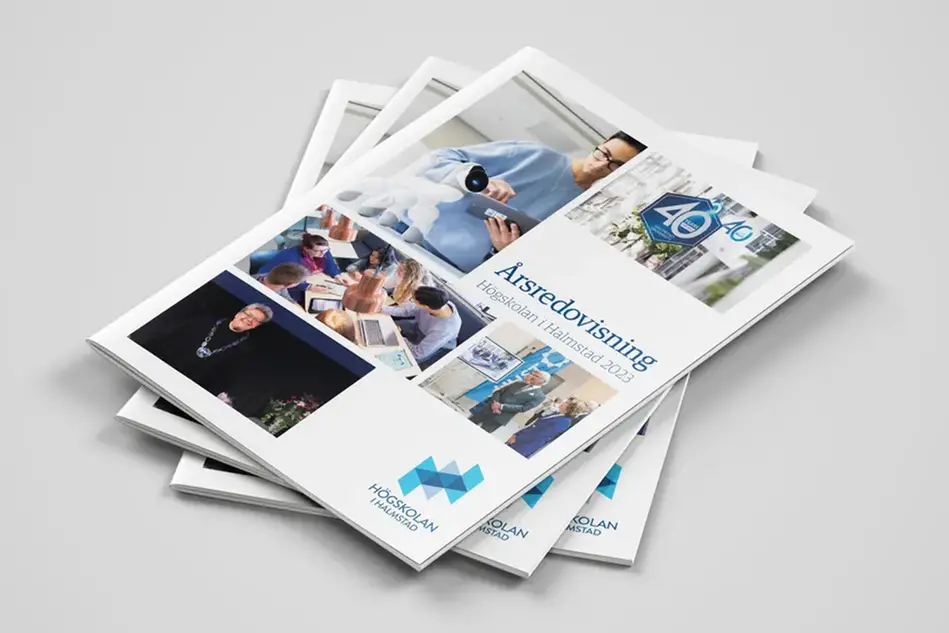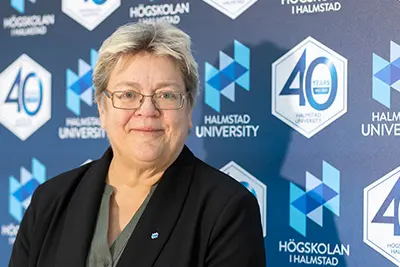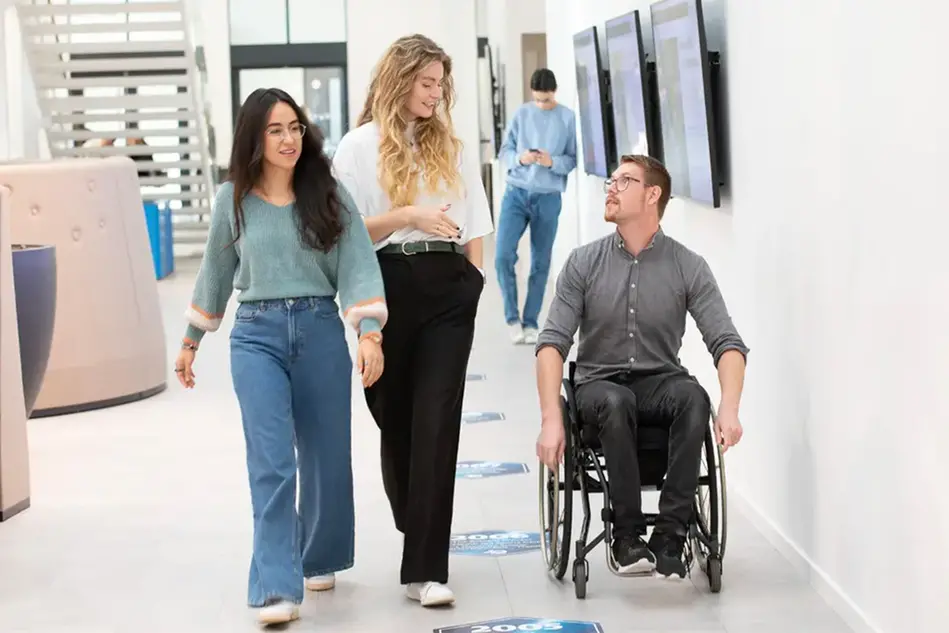The University marks the end of the 40th anniversary year
The University has submitted its annual report for 2023 to the Government. In addition to regular activities and special assignments, the University’s 40th anniversary celebration was a large part of last year. 2023 was also the year when Halmstad University got a new Vice-Chancellor, the first woman in office.
“It is particularly pleasing when it comes to research that external funding increased, completely in the direction indicated by the University Governing Board.”
Susanna Öhman, Vice-Chancellor

The 2023 annual report.
Throughout 2023, the University celebrated 40 years as an independent university with pride and festivity! After the anniversary inauguration in January, different events succeeded each other, one after the other. A highlight was, of course, when the University's new Vice-Chancellor Susanna Öhman took office in March and was later inaugurated in November. She is the University’s first woman to hold the position of Vice-Chancellor.

Vice-Chancellor Susanna Öhman.
“I took over as Vice-Chancellor in March this year – and what a year to start as Vice-Chancellor when the University celebrated its 40th anniversary. At the same time, it was a dramatic year in the world around us, with continued war in Europe, a new one in the Middle East and a deteriorating security situation, including in Sweden. The year was also fraught with economic challenges, with inflation and rising interest rates,” says Susanna Öhman.
For Halmstad University, it was also an eventful year, albeit less dramatic and in many ways more positive than the development of society as a whole, says the Vice-Chancellor.
Education with great societal relevance
The University's strength lies in attractive programmes with great relevance to society and in research that builds its strength and profile through close collaboration with companies and public organisations. It is a recipe for success that has been developed and sharpened over the years.

The University has a mission to increase the proportion of full-time equivalent students in programmes in shortage professions such as engineers, teachers, nurses, social workers and in the field of data/IT. Since 2013, the proportion of full-time equivalent students in programmes for professions in shortage has increased by 51 percent and now accounts for 54 per cent of the number of full-time equivalent students in all programmes, and 62 per cent in entry-level programmes.
The number of individuals who applied for an education at Halmstad University for the autumn semester of 2023 decreased for the second year in a row but was still significantly larger (17 per cent more) than before the pandemic. The number of applicants also decreased nationally but was still larger than before the pandemic (4 per cent more).
The programme IT Forensics and Information Security was the most applied for programme, followed by the Nursing Programme in Halmstad, the Social Work Programme, the Programme in Business and Economics and Criminology and Culture.
“All of these programmes have been developed by knowledgeable employees who have identified needs in society and worked purposefully to build up both skills and content in the programmes. In addition, close collaboration and dialogue with stakeholders are needed in order for the programmes to be able to meet society’s needs,” says Susanna Öhman, who is particularly pleased with the first batch of social workers who graduated at the end of the autumn semester 2023:
“This programme has been highly requested by Halland’s municipalities.”
Multidisciplinary research programmes
As part of the University’s research strategy, four new long-term research programmes were established during the year, one in the focus area Health Innovation and three in the focus area Smart Cities and Communities. The programmes are part of the University’s investment in multidisciplinary research to strengthen the University’s profile. The new programmes deal with health-related societal challenges; norms in transformation and innovation processes, design ethnographic perspectives on sustainable urban development, and challenges linked to circularity and sustainability. They complement the two previous research programmes, which deal with learning in a digital society and information driven care.

Eren Erdal Aksoy is an associate professor and project manager for the Europe Horizon project ROADVIEW, which deals with automated driving in extreme weather.
“It is particularly pleasing when it comes to research that external funding increased, completely in the direction indicated by the University Governing Board. For long-term sustainable development, we need to increase external income as the appropriation-funded activities are not expected to increase in the next few years,” says Susanna Öhman.
The proportion of employees with doctoral degrees also increased. Now, 77 percent of the University's teaching staff have a doctoral degree, which is in line with the goal that at least two-thirds of the University's teachers should have this competence.
During the year, the University hosted the international research conference Nordic Health Promotion Research Conference and co-organised the International Place Branding Association’s annual conference, which was held in Helsingborg.
Skills development for companies in Halland
Another example of societal relevance is the University’s successful efforts for skills development in the public sector and industry. At the beginning of the year, the University was granted a new EU-funded project on skills development for professionals, Skills Halland. It will run for two years and is run in collaboration with TEK Kompetens and Region Halland. The courses are about digitisation, automation and sustainability.
Strategic initiatives
The University’s finances are strong, even though the result this year showed a deficit in its operations. The deficit was mainly due to two factors: firstly, that the increased inflation led to increased costs, primarily for rents and operations, and secondly, as a result of strategic investments through agency capital.
“The University’s agency capital is significantly greater than the target ten per cent of turnover. Therefore, it is used for strategic initiatives such as a major skills development initiative, primarily for lecturers, and to meet the existing need for investments in new IT infrastructure, not least with the aim of increasing IT security,” explains Vice-Chancellor Susanna Öhman.
Text: Lena Lundén
Photos: Ida Fridvall and Dan Bergmark

